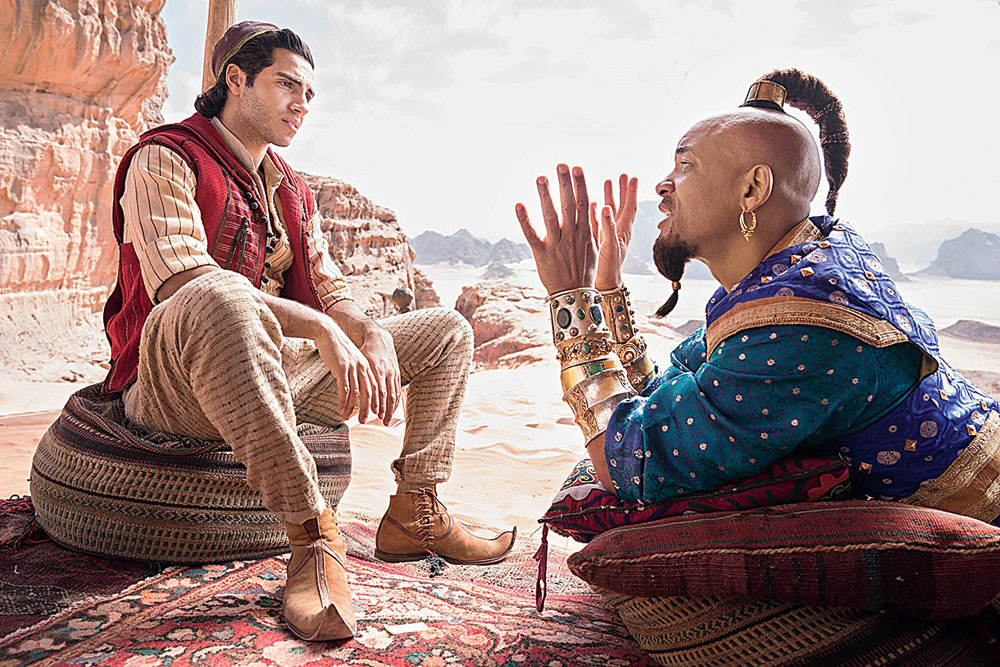Aladdin, the 1992 cartoon feature with Robin Williams as a garrulous blue genie, may not be the best movie from Disney’s second golden age of animation, but has durable charms and memorable songs. Aladdin, the new live-action re-whatever with a blue Will Smith popping out of the lamp, may not be the worst product of the current era of legacy intellectual property exploitation, but like most of the others it invites a simple question: Why?
The answer — spoiler alert: “money” — may not surprise you. I know it’s pointless to complain about Disney’s drive to wring every last dollar from its various brands. But the movie itself, while not entirely terrible — a lot of craft has been purchased, and even a little art — is pointless in a particularly aggressive way.
The studio’s earlier cash-grab strategy was to protect the classic status of its “A” material through managed scarcity and lavish reissuing. Each new micro-generation of viewers could be initiated into fandom with a bit of ceremony: here was an old thing that was being passed on to you in a shiny new package, a polished heirloom in the form of a special VHS or DVD edition or a limited run in theatres. What had belonged to your parents and grandparents could also be yours, whether it was Snow White or The Little Mermaid. (Not anymore with Song of the South, though.)
There were problems with this approach, including the preservation of tropes and images that came to seem old-fashioned, and not necessarily in a good way. The patriarchal princess stories. The cultural and racial stereotypes. That kind of thing. But Disney, long committed to doing well by meaning well, has synergised evolving social attitudes with advancing digital technology to concoct a series of updates.
None of these has surpassed the original, but that might be too much to ask. I can’t think of one — not The Jungle Book, not Mary Poppins Returns, not the recent, sombre Dumbo, certainly not this “Aladdin” - that seems able to stand alone in the popular imagination. They are weird and grotesque hybrids, belonging to no particular era, style or creative sensibility, like dishes at a chain restaurant that fuse disparate food trends to produce flavors alien to every known earthly cuisine.
Aladdin is not a cartoon, but it takes place in cartoonlike spaces that trade the grace and flow of animation for the cold literalism of computer-generated imagery. The animal sidekicks — a mischievous monkey, a loyal tiger and a malignant parrot — are neither cute nor especially realistic. The human beings occupying the frame alongside them look, with the partial exception of the genie, like people dressed up as Disney characters.
Aladdin (Mena Massoud) is a thief plying his trade in the marketplaces of the vaguely, vividly Middle Eastern fantasyland of Agrabah, where he meets and falls for Princess Jasmine (Naomi Scott). Her father, the kindly old Sultan (Navid Negahban), is being undermined by his diabolical vizier, Jafar (Marwan Kenzari). Aladdin and his monkey, Abu, are joined by a magic carpet and a blue genie who grants wishes and also develops a crush on Jasmine’s handmaiden, Dalia (Nasim Pedrad).
The casting is admirable. There’s a brisk, enjoyable early chase through the casbah — the kind of springy action that the director, Guy Ritchie, does pretty well — and a couple of Bollywood-inflected numbers that remind you, pleasantly enough, of the proud history of the musical as a film genre. Some of the voices may make you regret the reminder. (Scott’s is by far the strongest; Smith is not a great singer). You’ll hear a few favourites from the old Aladdin. Alan Menken is still a wonderful composer, by the way.
But somehow the most familiar songs, rather than lending lustre to this version of the story, only highlight its incoherence. A Whole New World, sung as Aladdin and Jasmine take a moonlit carpet ride above Agrabah and other picturesque locales, conveys neither the novelty of flight nor the wonder of discovery. The visuals are tired and perfunctory green-screen placeholders.
One of the new songs, belted out with great conviction by Scott, is called Speechless, a ham-fisted attempt to paste some power-princess feminism into the film that feels almost as condescending as the women-in-battle sequence in Avengers: Endgame.
And as for the film’s supposed lessons — that you should just be yourself and not be seduced by wealth and power — I mean, come on. What makes the Disney classics, old and new, so durable is their ability to fuse commercialism with magic in a way that overwhelms cynicism. When that fails, what we’re left with is thievery.











